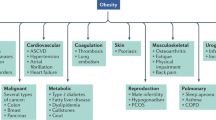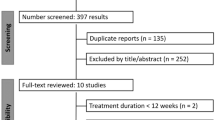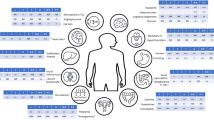Abstract
OBJECTIVE: Obesity poses a serious health hazard and its treatment is often disappointing. This review describes the present status of pharmacological treatment of obesity in man.
DESIGN: Obesity treatment may include drugs that reduce food intake, drugs that increase energy expenditure and drugs that affect nutrient partitioning or metabolism. The mode of action, efficacy and safety of each approach will be briefly discussed.
RESULTS: All of the pharmacological possibilities have potential activities, but also serious limitations. While current anti-obesity pharmacotherapy essentially uses centrally-acting anorectic drugs, severe side-effects (more particularly pulmonary hypertension and valvular heart disease) have been reported, leading to the withdrawal of licensed fenfluramine and d-fenfluramine. New approaches have been recently proposed, such as sibutramine, an amine reuptake inhibitor which decreases food intake, and orlistat, an intestinal lipase inhibitor which decreases fat absorption.
Obesity is a chronic disease and should be treated as such with reasonable expectations. Large-scale one-year placebo-controlled studies demonstrated that d-fenfluramine, sibutramine and orlistat significantly increased body weight loss by an average of 2–4 kg when compared to placebo and, more interestingly, multiplied by 2–3 the number of patients who succeeded in obtaining and maintaining a reduction of more than 10% of initial body weight. Interestingly, some of these compounds may also exert favourable effects on other vascular risk factors, independently of weight loss.
CONCLUSIONS: Even if all anti-obesity pharmacological approaches can be helpful, they also have important limitations so that other strategies including either combined therapies or new drugs (peptides) are currently under investigation.
This is a preview of subscription content, access via your institution
Access options
Subscribe to this journal
Receive 12 print issues and online access
$259.00 per year
only $21.58 per issue
Buy this article
- Purchase on Springer Link
- Instant access to full article PDF
Prices may be subject to local taxes which are calculated during checkout
Similar content being viewed by others
Author information
Authors and Affiliations
Rights and permissions
About this article
Cite this article
Scheen, A., Lefébvre, P. Pharmacological treatment of obesity: present status. Int J Obes 23 (Suppl 1), S47–S53 (1999). https://doi.org/10.1038/sj.ijo.0800795
Published:
Issue Date:
DOI: https://doi.org/10.1038/sj.ijo.0800795
Keywords
This article is cited by
-
Effects of low-doses of methamphetamine on d-fenfluramine-induced head-twitch response (HTR) in mice during ageing and c-fos expression in the prefrontal cortex
BMC Neuroscience (2023)
-
Computational molecular modelling of N-cinnamoyl and hydroxycinnamoyl amides as potential α-glucosidase inhibitors
Medicinal Chemistry Research (2018)
-
Current and novel approaches to the drug therapy of obesity
European Journal of Clinical Pharmacology (2006)
-
Systematic review of long-term weight loss studies in obese adults: clinical significance and applicability to clinical practice
International Journal of Obesity (2005)
-
Dietary diacylglycerol prevents high‐fat diet‐induced lipid accumulation in rat liver and abdominal adipose tissue
Lipids (2004)



